LAW93104 Consumer Law: Analysis and Advice Letter on Veganics Company
VerifiedAdded on 2022/09/18
|12
|2919
|28
Homework Assignment
AI Summary
This assignment presents an advice letter addressing a consumer law case involving the Veganics Company. The student analyzes the situation under the Australian Consumer Law (Competition and Consumer Act 2010 - Schedule 2). The letter discusses potential remedies for clients, examining issues such as misleading and deceptive conduct, unconscionable conduct, unfair contract terms, unsolicited services, and acceptable quality of goods. The analysis includes relevant case law, such as Henjo Investments Pty Ltd v Collins Marrickville Pty Ltd and ACCC v Homeopathy Plus! Australia Pty Ltd, to support the legal arguments. The assignment considers a scenario where a single mother, Martha, is recruited by Helena to sell Veganics skincare products. The analysis explores whether the conduct of Veganics and its representatives constitutes misleading or unconscionable behavior, and whether the products supplied met the standards of acceptable quality. The student concludes by advising the clients on the legal recourse they can pursue.
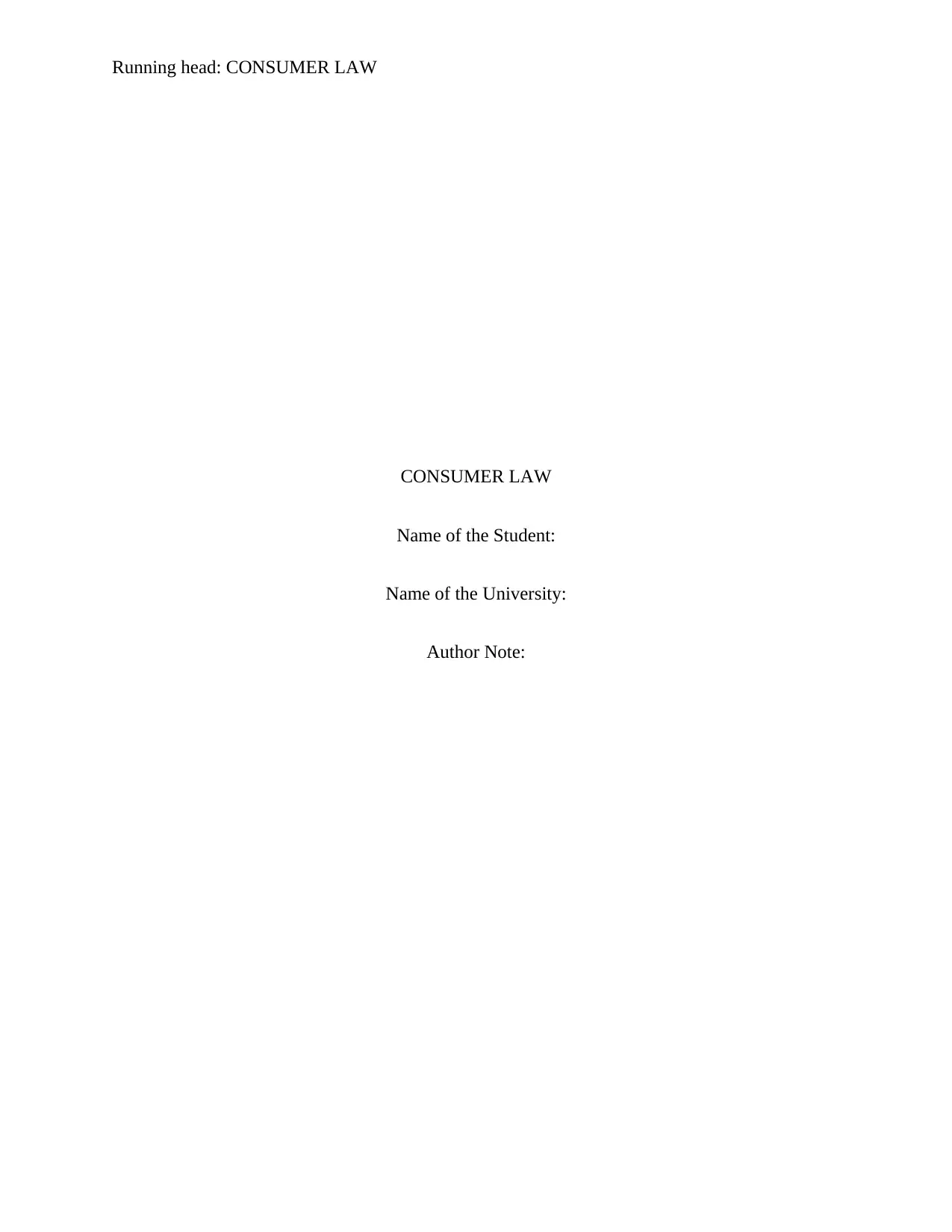
Running head: CONSUMER LAW
CONSUMER LAW
Name of the Student:
Name of the University:
Author Note:
CONSUMER LAW
Name of the Student:
Name of the University:
Author Note:
Paraphrase This Document
Need a fresh take? Get an instant paraphrase of this document with our AI Paraphraser
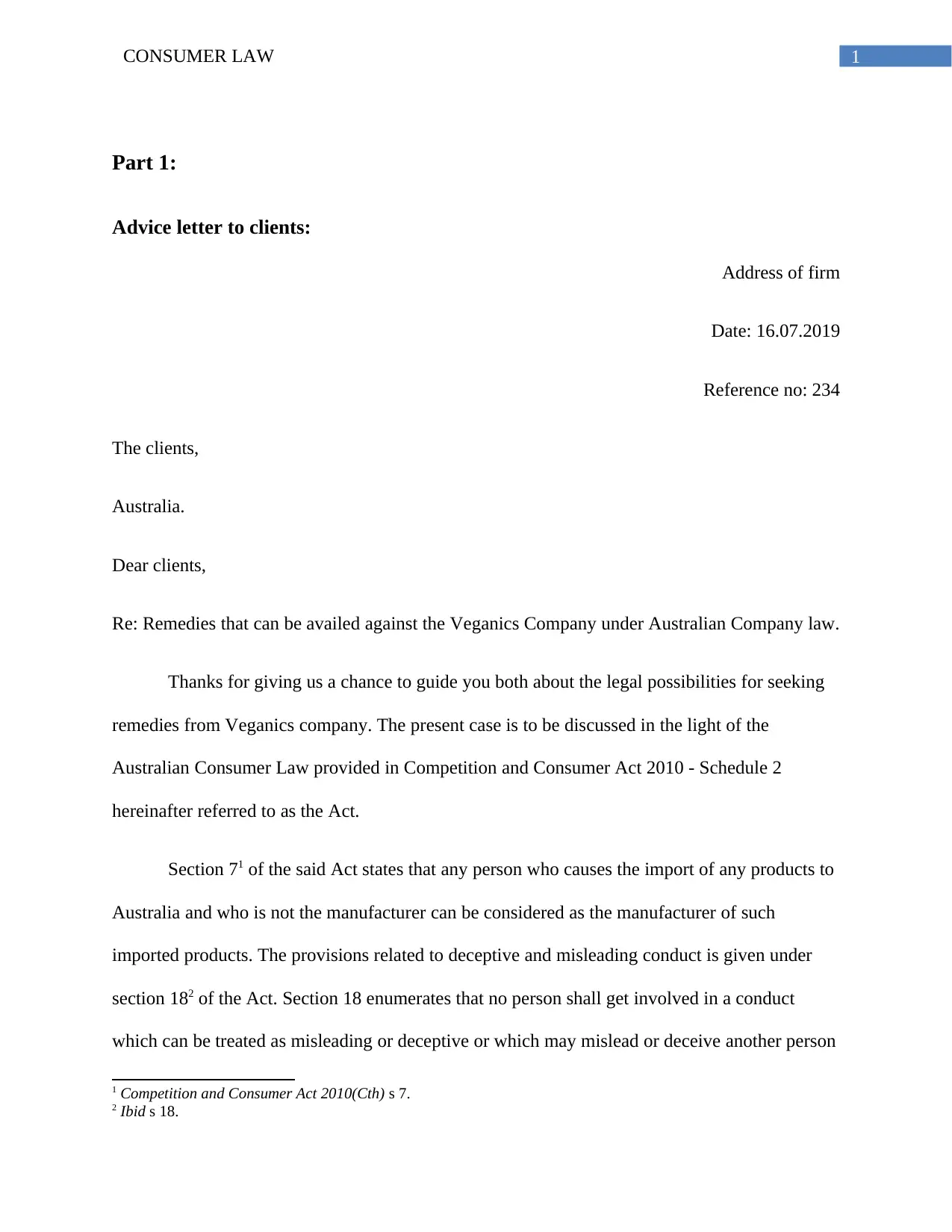
1CONSUMER LAW
Part 1:
Advice letter to clients:
Address of firm
Date: 16.07.2019
Reference no: 234
The clients,
Australia.
Dear clients,
Re: Remedies that can be availed against the Veganics Company under Australian Company law.
Thanks for giving us a chance to guide you both about the legal possibilities for seeking
remedies from Veganics company. The present case is to be discussed in the light of the
Australian Consumer Law provided in Competition and Consumer Act 2010 - Schedule 2
hereinafter referred to as the Act.
Section 71 of the said Act states that any person who causes the import of any products to
Australia and who is not the manufacturer can be considered as the manufacturer of such
imported products. The provisions related to deceptive and misleading conduct is given under
section 182 of the Act. Section 18 enumerates that no person shall get involved in a conduct
which can be treated as misleading or deceptive or which may mislead or deceive another person
1 Competition and Consumer Act 2010(Cth) s 7.
2 Ibid s 18.
Part 1:
Advice letter to clients:
Address of firm
Date: 16.07.2019
Reference no: 234
The clients,
Australia.
Dear clients,
Re: Remedies that can be availed against the Veganics Company under Australian Company law.
Thanks for giving us a chance to guide you both about the legal possibilities for seeking
remedies from Veganics company. The present case is to be discussed in the light of the
Australian Consumer Law provided in Competition and Consumer Act 2010 - Schedule 2
hereinafter referred to as the Act.
Section 71 of the said Act states that any person who causes the import of any products to
Australia and who is not the manufacturer can be considered as the manufacturer of such
imported products. The provisions related to deceptive and misleading conduct is given under
section 182 of the Act. Section 18 enumerates that no person shall get involved in a conduct
which can be treated as misleading or deceptive or which may mislead or deceive another person
1 Competition and Consumer Act 2010(Cth) s 7.
2 Ibid s 18.
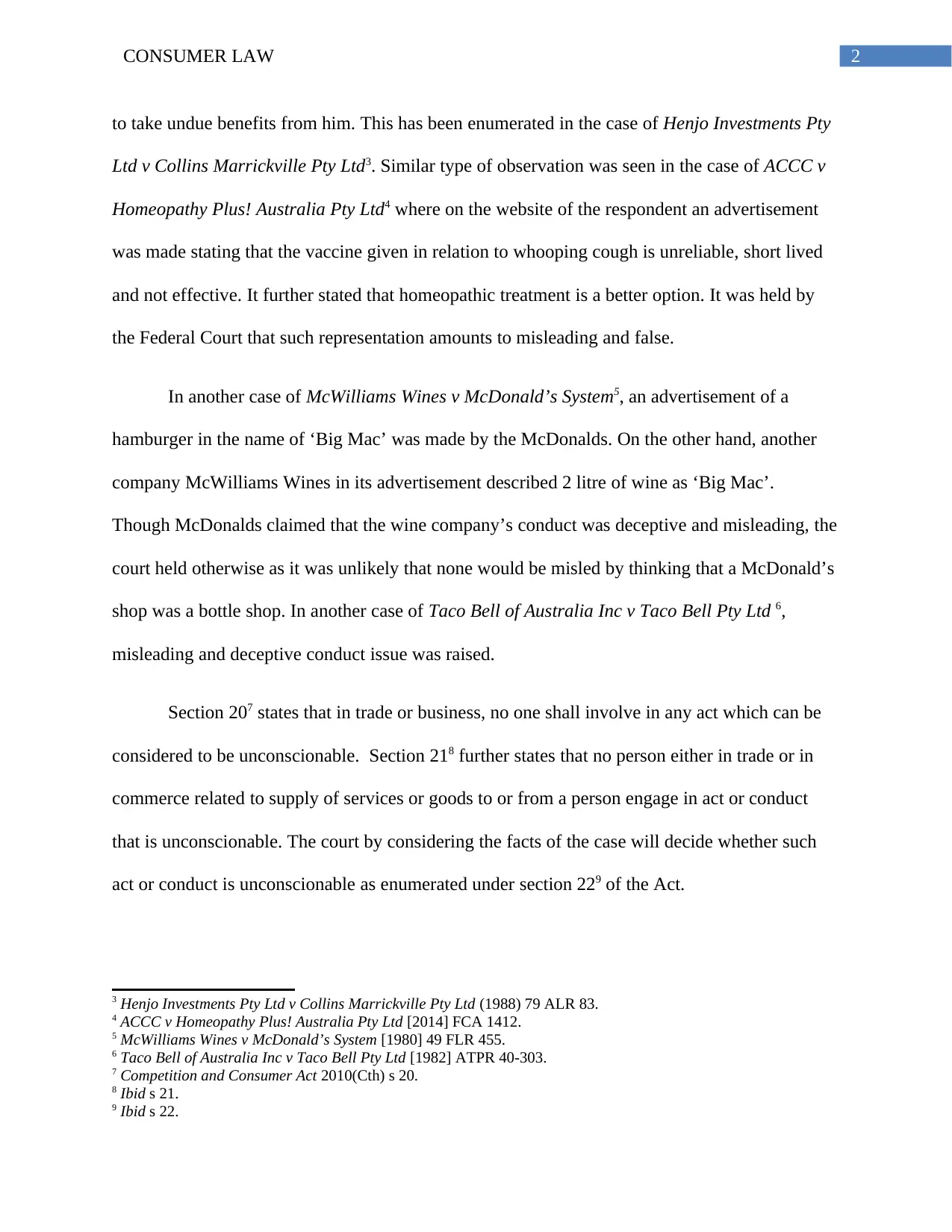
2CONSUMER LAW
to take undue benefits from him. This has been enumerated in the case of Henjo Investments Pty
Ltd v Collins Marrickville Pty Ltd3. Similar type of observation was seen in the case of ACCC v
Homeopathy Plus! Australia Pty Ltd4 where on the website of the respondent an advertisement
was made stating that the vaccine given in relation to whooping cough is unreliable, short lived
and not effective. It further stated that homeopathic treatment is a better option. It was held by
the Federal Court that such representation amounts to misleading and false.
In another case of McWilliams Wines v McDonald’s System5, an advertisement of a
hamburger in the name of ‘Big Mac’ was made by the McDonalds. On the other hand, another
company McWilliams Wines in its advertisement described 2 litre of wine as ‘Big Mac’.
Though McDonalds claimed that the wine company’s conduct was deceptive and misleading, the
court held otherwise as it was unlikely that none would be misled by thinking that a McDonald’s
shop was a bottle shop. In another case of Taco Bell of Australia Inc v Taco Bell Pty Ltd 6,
misleading and deceptive conduct issue was raised.
Section 207 states that in trade or business, no one shall involve in any act which can be
considered to be unconscionable. Section 218 further states that no person either in trade or in
commerce related to supply of services or goods to or from a person engage in act or conduct
that is unconscionable. The court by considering the facts of the case will decide whether such
act or conduct is unconscionable as enumerated under section 229 of the Act.
3 Henjo Investments Pty Ltd v Collins Marrickville Pty Ltd (1988) 79 ALR 83.
4 ACCC v Homeopathy Plus! Australia Pty Ltd [2014] FCA 1412.
5 McWilliams Wines v McDonald’s System [1980] 49 FLR 455.
6 Taco Bell of Australia Inc v Taco Bell Pty Ltd [1982] ATPR 40-303.
7 Competition and Consumer Act 2010(Cth) s 20.
8 Ibid s 21.
9 Ibid s 22.
to take undue benefits from him. This has been enumerated in the case of Henjo Investments Pty
Ltd v Collins Marrickville Pty Ltd3. Similar type of observation was seen in the case of ACCC v
Homeopathy Plus! Australia Pty Ltd4 where on the website of the respondent an advertisement
was made stating that the vaccine given in relation to whooping cough is unreliable, short lived
and not effective. It further stated that homeopathic treatment is a better option. It was held by
the Federal Court that such representation amounts to misleading and false.
In another case of McWilliams Wines v McDonald’s System5, an advertisement of a
hamburger in the name of ‘Big Mac’ was made by the McDonalds. On the other hand, another
company McWilliams Wines in its advertisement described 2 litre of wine as ‘Big Mac’.
Though McDonalds claimed that the wine company’s conduct was deceptive and misleading, the
court held otherwise as it was unlikely that none would be misled by thinking that a McDonald’s
shop was a bottle shop. In another case of Taco Bell of Australia Inc v Taco Bell Pty Ltd 6,
misleading and deceptive conduct issue was raised.
Section 207 states that in trade or business, no one shall involve in any act which can be
considered to be unconscionable. Section 218 further states that no person either in trade or in
commerce related to supply of services or goods to or from a person engage in act or conduct
that is unconscionable. The court by considering the facts of the case will decide whether such
act or conduct is unconscionable as enumerated under section 229 of the Act.
3 Henjo Investments Pty Ltd v Collins Marrickville Pty Ltd (1988) 79 ALR 83.
4 ACCC v Homeopathy Plus! Australia Pty Ltd [2014] FCA 1412.
5 McWilliams Wines v McDonald’s System [1980] 49 FLR 455.
6 Taco Bell of Australia Inc v Taco Bell Pty Ltd [1982] ATPR 40-303.
7 Competition and Consumer Act 2010(Cth) s 20.
8 Ibid s 21.
9 Ibid s 22.
⊘ This is a preview!⊘
Do you want full access?
Subscribe today to unlock all pages.

Trusted by 1+ million students worldwide
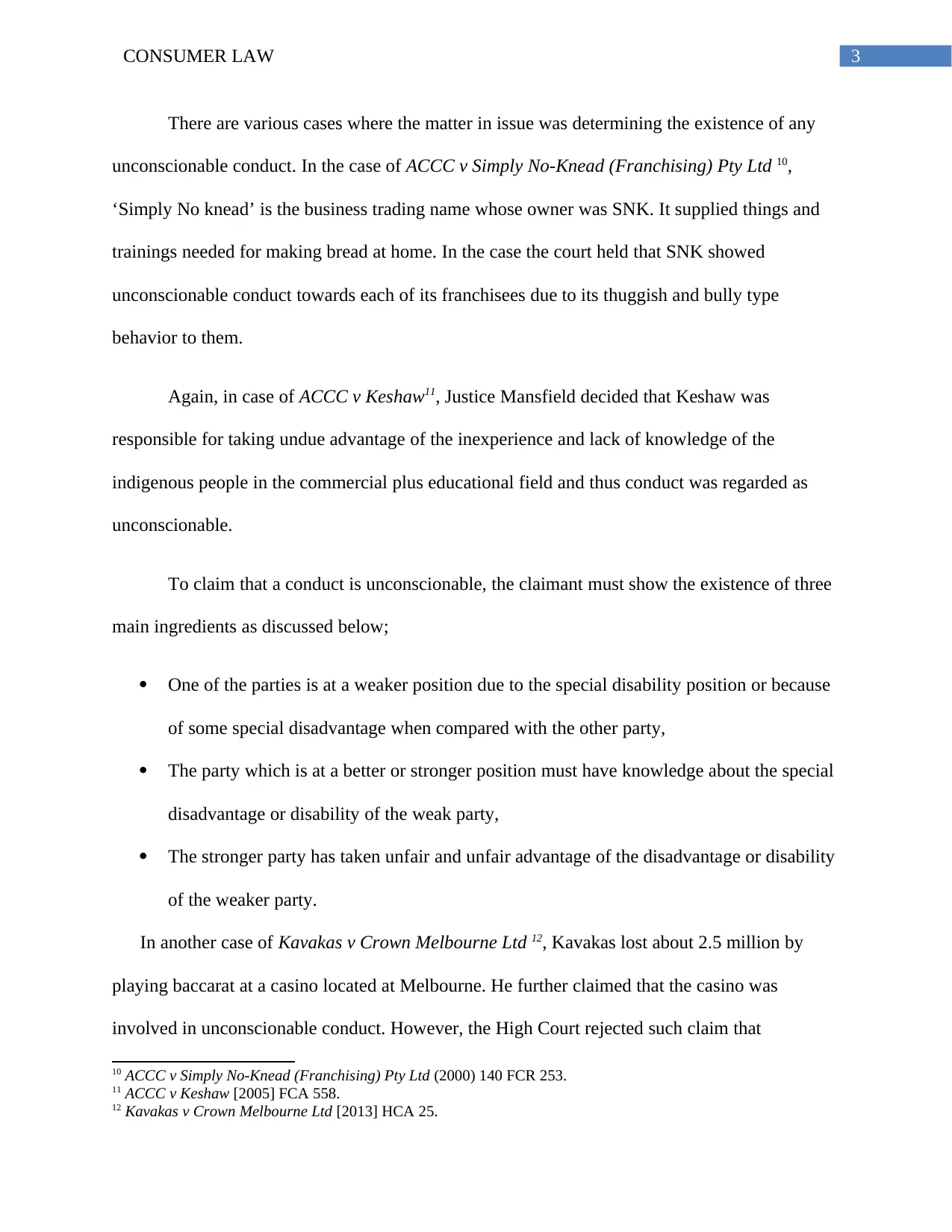
3CONSUMER LAW
There are various cases where the matter in issue was determining the existence of any
unconscionable conduct. In the case of ACCC v Simply No-Knead (Franchising) Pty Ltd 10,
‘Simply No knead’ is the business trading name whose owner was SNK. It supplied things and
trainings needed for making bread at home. In the case the court held that SNK showed
unconscionable conduct towards each of its franchisees due to its thuggish and bully type
behavior to them.
Again, in case of ACCC v Keshaw11, Justice Mansfield decided that Keshaw was
responsible for taking undue advantage of the inexperience and lack of knowledge of the
indigenous people in the commercial plus educational field and thus conduct was regarded as
unconscionable.
To claim that a conduct is unconscionable, the claimant must show the existence of three
main ingredients as discussed below;
One of the parties is at a weaker position due to the special disability position or because
of some special disadvantage when compared with the other party,
The party which is at a better or stronger position must have knowledge about the special
disadvantage or disability of the weak party,
The stronger party has taken unfair and unfair advantage of the disadvantage or disability
of the weaker party.
In another case of Kavakas v Crown Melbourne Ltd 12, Kavakas lost about 2.5 million by
playing baccarat at a casino located at Melbourne. He further claimed that the casino was
involved in unconscionable conduct. However, the High Court rejected such claim that
10 ACCC v Simply No-Knead (Franchising) Pty Ltd (2000) 140 FCR 253.
11 ACCC v Keshaw [2005] FCA 558.
12 Kavakas v Crown Melbourne Ltd [2013] HCA 25.
There are various cases where the matter in issue was determining the existence of any
unconscionable conduct. In the case of ACCC v Simply No-Knead (Franchising) Pty Ltd 10,
‘Simply No knead’ is the business trading name whose owner was SNK. It supplied things and
trainings needed for making bread at home. In the case the court held that SNK showed
unconscionable conduct towards each of its franchisees due to its thuggish and bully type
behavior to them.
Again, in case of ACCC v Keshaw11, Justice Mansfield decided that Keshaw was
responsible for taking undue advantage of the inexperience and lack of knowledge of the
indigenous people in the commercial plus educational field and thus conduct was regarded as
unconscionable.
To claim that a conduct is unconscionable, the claimant must show the existence of three
main ingredients as discussed below;
One of the parties is at a weaker position due to the special disability position or because
of some special disadvantage when compared with the other party,
The party which is at a better or stronger position must have knowledge about the special
disadvantage or disability of the weak party,
The stronger party has taken unfair and unfair advantage of the disadvantage or disability
of the weaker party.
In another case of Kavakas v Crown Melbourne Ltd 12, Kavakas lost about 2.5 million by
playing baccarat at a casino located at Melbourne. He further claimed that the casino was
involved in unconscionable conduct. However, the High Court rejected such claim that
10 ACCC v Simply No-Knead (Franchising) Pty Ltd (2000) 140 FCR 253.
11 ACCC v Keshaw [2005] FCA 558.
12 Kavakas v Crown Melbourne Ltd [2013] HCA 25.
Paraphrase This Document
Need a fresh take? Get an instant paraphrase of this document with our AI Paraphraser
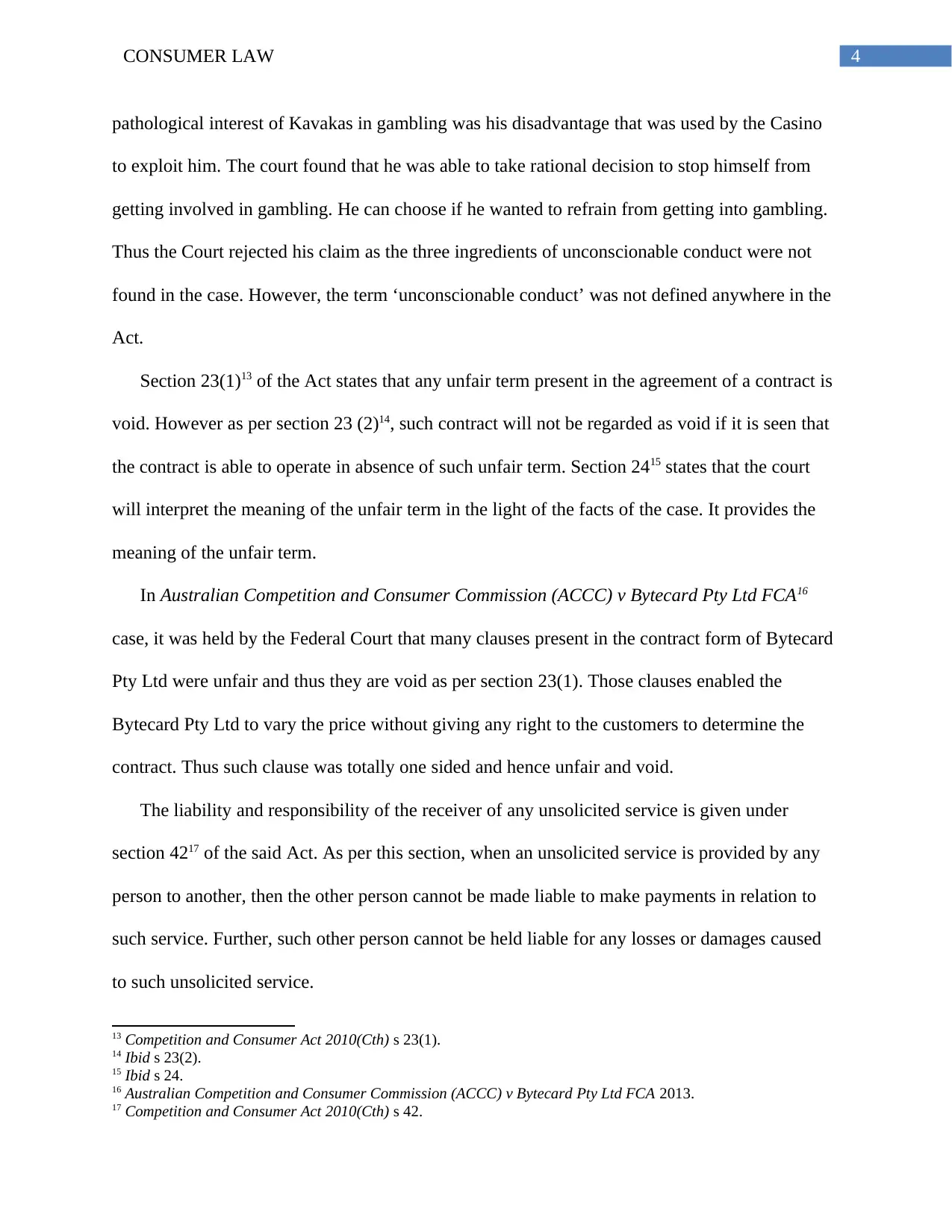
4CONSUMER LAW
pathological interest of Kavakas in gambling was his disadvantage that was used by the Casino
to exploit him. The court found that he was able to take rational decision to stop himself from
getting involved in gambling. He can choose if he wanted to refrain from getting into gambling.
Thus the Court rejected his claim as the three ingredients of unconscionable conduct were not
found in the case. However, the term ‘unconscionable conduct’ was not defined anywhere in the
Act.
Section 23(1)13 of the Act states that any unfair term present in the agreement of a contract is
void. However as per section 23 (2)14, such contract will not be regarded as void if it is seen that
the contract is able to operate in absence of such unfair term. Section 2415 states that the court
will interpret the meaning of the unfair term in the light of the facts of the case. It provides the
meaning of the unfair term.
In Australian Competition and Consumer Commission (ACCC) v Bytecard Pty Ltd FCA16
case, it was held by the Federal Court that many clauses present in the contract form of Bytecard
Pty Ltd were unfair and thus they are void as per section 23(1). Those clauses enabled the
Bytecard Pty Ltd to vary the price without giving any right to the customers to determine the
contract. Thus such clause was totally one sided and hence unfair and void.
The liability and responsibility of the receiver of any unsolicited service is given under
section 4217 of the said Act. As per this section, when an unsolicited service is provided by any
person to another, then the other person cannot be made liable to make payments in relation to
such service. Further, such other person cannot be held liable for any losses or damages caused
to such unsolicited service.
13 Competition and Consumer Act 2010(Cth) s 23(1).
14 Ibid s 23(2).
15 Ibid s 24.
16 Australian Competition and Consumer Commission (ACCC) v Bytecard Pty Ltd FCA 2013.
17 Competition and Consumer Act 2010(Cth) s 42.
pathological interest of Kavakas in gambling was his disadvantage that was used by the Casino
to exploit him. The court found that he was able to take rational decision to stop himself from
getting involved in gambling. He can choose if he wanted to refrain from getting into gambling.
Thus the Court rejected his claim as the three ingredients of unconscionable conduct were not
found in the case. However, the term ‘unconscionable conduct’ was not defined anywhere in the
Act.
Section 23(1)13 of the Act states that any unfair term present in the agreement of a contract is
void. However as per section 23 (2)14, such contract will not be regarded as void if it is seen that
the contract is able to operate in absence of such unfair term. Section 2415 states that the court
will interpret the meaning of the unfair term in the light of the facts of the case. It provides the
meaning of the unfair term.
In Australian Competition and Consumer Commission (ACCC) v Bytecard Pty Ltd FCA16
case, it was held by the Federal Court that many clauses present in the contract form of Bytecard
Pty Ltd were unfair and thus they are void as per section 23(1). Those clauses enabled the
Bytecard Pty Ltd to vary the price without giving any right to the customers to determine the
contract. Thus such clause was totally one sided and hence unfair and void.
The liability and responsibility of the receiver of any unsolicited service is given under
section 4217 of the said Act. As per this section, when an unsolicited service is provided by any
person to another, then the other person cannot be made liable to make payments in relation to
such service. Further, such other person cannot be held liable for any losses or damages caused
to such unsolicited service.
13 Competition and Consumer Act 2010(Cth) s 23(1).
14 Ibid s 23(2).
15 Ibid s 24.
16 Australian Competition and Consumer Commission (ACCC) v Bytecard Pty Ltd FCA 2013.
17 Competition and Consumer Act 2010(Cth) s 42.
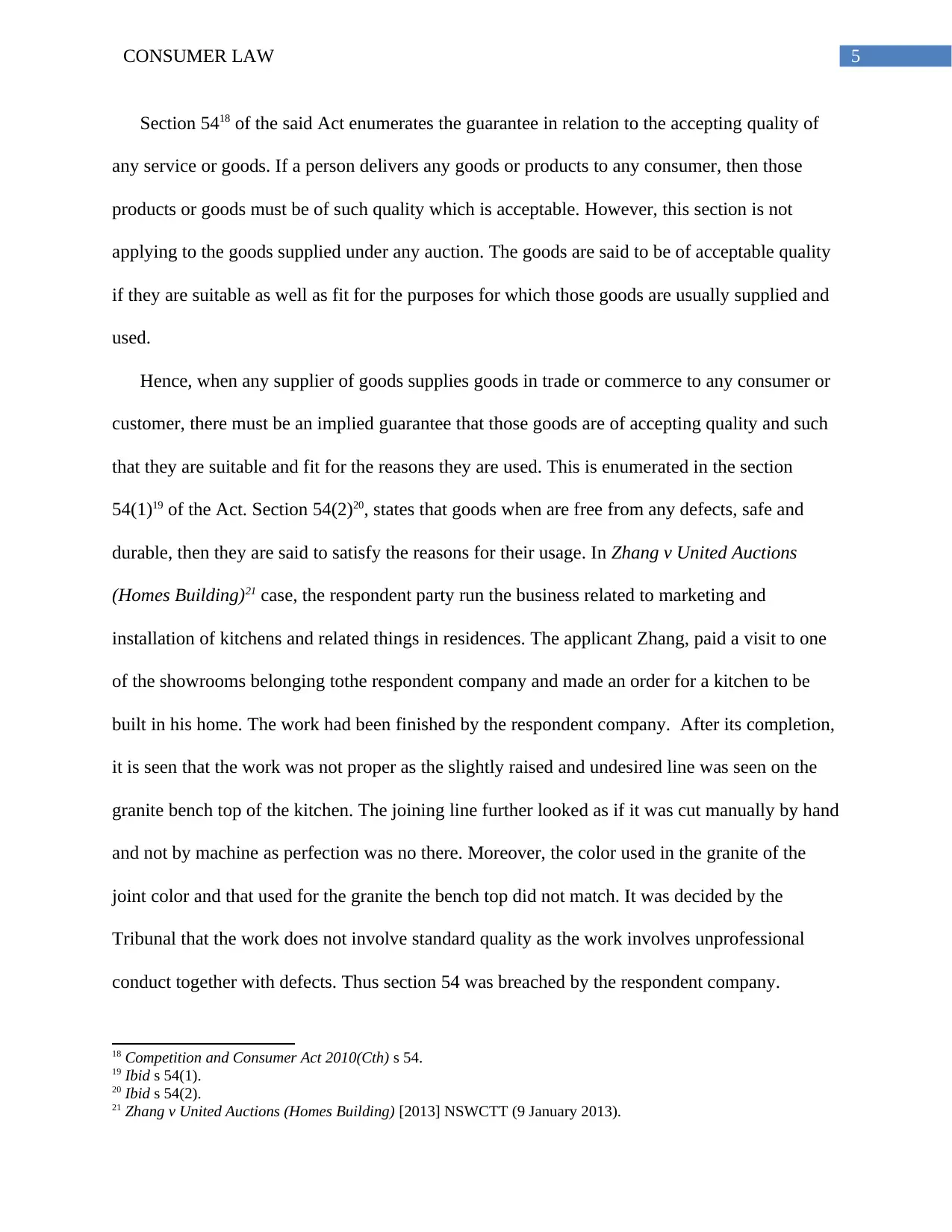
5CONSUMER LAW
Section 5418 of the said Act enumerates the guarantee in relation to the accepting quality of
any service or goods. If a person delivers any goods or products to any consumer, then those
products or goods must be of such quality which is acceptable. However, this section is not
applying to the goods supplied under any auction. The goods are said to be of acceptable quality
if they are suitable as well as fit for the purposes for which those goods are usually supplied and
used.
Hence, when any supplier of goods supplies goods in trade or commerce to any consumer or
customer, there must be an implied guarantee that those goods are of accepting quality and such
that they are suitable and fit for the reasons they are used. This is enumerated in the section
54(1)19 of the Act. Section 54(2)20, states that goods when are free from any defects, safe and
durable, then they are said to satisfy the reasons for their usage. In Zhang v United Auctions
(Homes Building)21 case, the respondent party run the business related to marketing and
installation of kitchens and related things in residences. The applicant Zhang, paid a visit to one
of the showrooms belonging tothe respondent company and made an order for a kitchen to be
built in his home. The work had been finished by the respondent company. After its completion,
it is seen that the work was not proper as the slightly raised and undesired line was seen on the
granite bench top of the kitchen. The joining line further looked as if it was cut manually by hand
and not by machine as perfection was no there. Moreover, the color used in the granite of the
joint color and that used for the granite the bench top did not match. It was decided by the
Tribunal that the work does not involve standard quality as the work involves unprofessional
conduct together with defects. Thus section 54 was breached by the respondent company.
18 Competition and Consumer Act 2010(Cth) s 54.
19 Ibid s 54(1).
20 Ibid s 54(2).
21 Zhang v United Auctions (Homes Building) [2013] NSWCTT (9 January 2013).
Section 5418 of the said Act enumerates the guarantee in relation to the accepting quality of
any service or goods. If a person delivers any goods or products to any consumer, then those
products or goods must be of such quality which is acceptable. However, this section is not
applying to the goods supplied under any auction. The goods are said to be of acceptable quality
if they are suitable as well as fit for the purposes for which those goods are usually supplied and
used.
Hence, when any supplier of goods supplies goods in trade or commerce to any consumer or
customer, there must be an implied guarantee that those goods are of accepting quality and such
that they are suitable and fit for the reasons they are used. This is enumerated in the section
54(1)19 of the Act. Section 54(2)20, states that goods when are free from any defects, safe and
durable, then they are said to satisfy the reasons for their usage. In Zhang v United Auctions
(Homes Building)21 case, the respondent party run the business related to marketing and
installation of kitchens and related things in residences. The applicant Zhang, paid a visit to one
of the showrooms belonging tothe respondent company and made an order for a kitchen to be
built in his home. The work had been finished by the respondent company. After its completion,
it is seen that the work was not proper as the slightly raised and undesired line was seen on the
granite bench top of the kitchen. The joining line further looked as if it was cut manually by hand
and not by machine as perfection was no there. Moreover, the color used in the granite of the
joint color and that used for the granite the bench top did not match. It was decided by the
Tribunal that the work does not involve standard quality as the work involves unprofessional
conduct together with defects. Thus section 54 was breached by the respondent company.
18 Competition and Consumer Act 2010(Cth) s 54.
19 Ibid s 54(1).
20 Ibid s 54(2).
21 Zhang v United Auctions (Homes Building) [2013] NSWCTT (9 January 2013).
⊘ This is a preview!⊘
Do you want full access?
Subscribe today to unlock all pages.

Trusted by 1+ million students worldwide
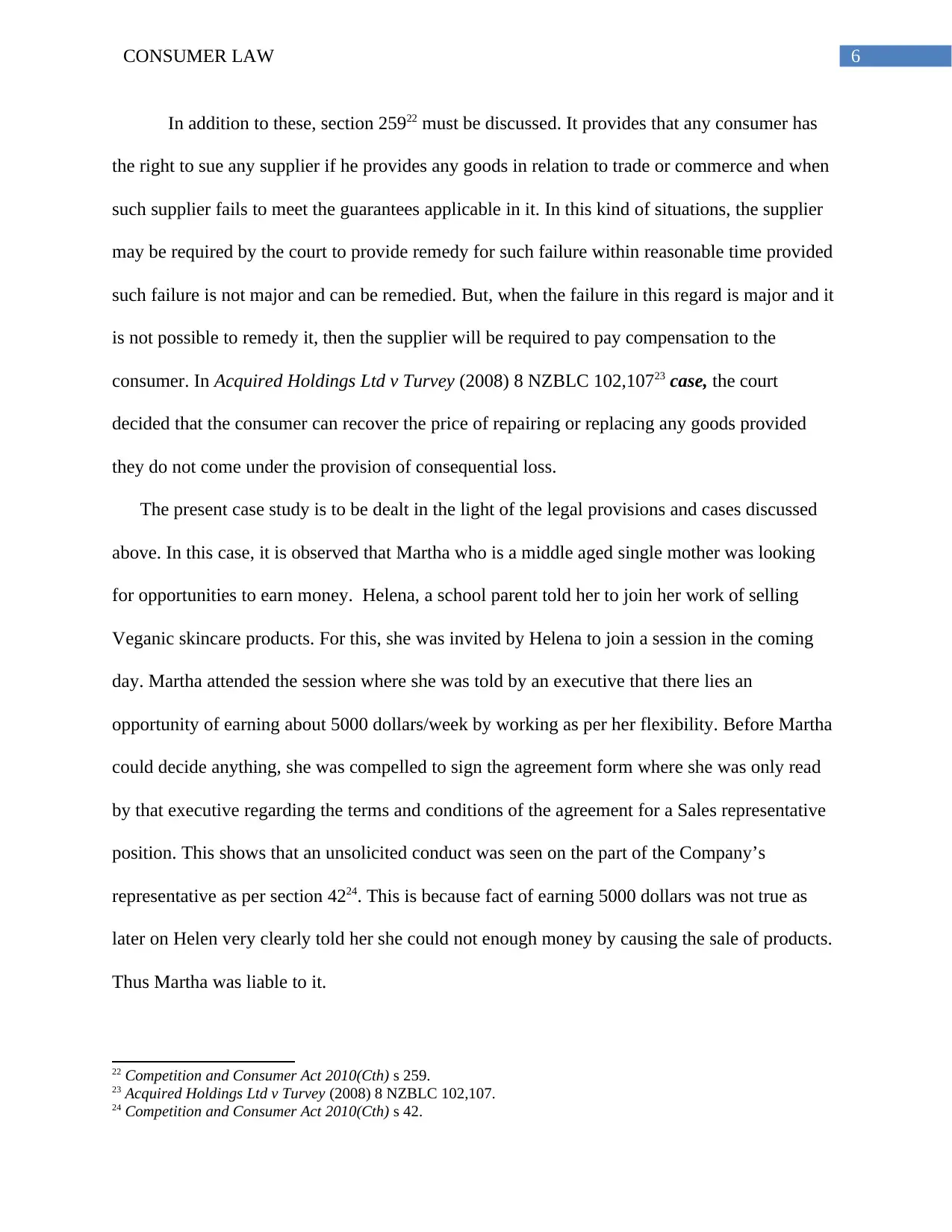
6CONSUMER LAW
In addition to these, section 25922 must be discussed. It provides that any consumer has
the right to sue any supplier if he provides any goods in relation to trade or commerce and when
such supplier fails to meet the guarantees applicable in it. In this kind of situations, the supplier
may be required by the court to provide remedy for such failure within reasonable time provided
such failure is not major and can be remedied. But, when the failure in this regard is major and it
is not possible to remedy it, then the supplier will be required to pay compensation to the
consumer. In Acquired Holdings Ltd v Turvey (2008) 8 NZBLC 102,10723 case, the court
decided that the consumer can recover the price of repairing or replacing any goods provided
they do not come under the provision of consequential loss.
The present case study is to be dealt in the light of the legal provisions and cases discussed
above. In this case, it is observed that Martha who is a middle aged single mother was looking
for opportunities to earn money. Helena, a school parent told her to join her work of selling
Veganic skincare products. For this, she was invited by Helena to join a session in the coming
day. Martha attended the session where she was told by an executive that there lies an
opportunity of earning about 5000 dollars/week by working as per her flexibility. Before Martha
could decide anything, she was compelled to sign the agreement form where she was only read
by that executive regarding the terms and conditions of the agreement for a Sales representative
position. This shows that an unsolicited conduct was seen on the part of the Company’s
representative as per section 4224. This is because fact of earning 5000 dollars was not true as
later on Helen very clearly told her she could not enough money by causing the sale of products.
Thus Martha was liable to it.
22 Competition and Consumer Act 2010(Cth) s 259.
23 Acquired Holdings Ltd v Turvey (2008) 8 NZBLC 102,107.
24 Competition and Consumer Act 2010(Cth) s 42.
In addition to these, section 25922 must be discussed. It provides that any consumer has
the right to sue any supplier if he provides any goods in relation to trade or commerce and when
such supplier fails to meet the guarantees applicable in it. In this kind of situations, the supplier
may be required by the court to provide remedy for such failure within reasonable time provided
such failure is not major and can be remedied. But, when the failure in this regard is major and it
is not possible to remedy it, then the supplier will be required to pay compensation to the
consumer. In Acquired Holdings Ltd v Turvey (2008) 8 NZBLC 102,10723 case, the court
decided that the consumer can recover the price of repairing or replacing any goods provided
they do not come under the provision of consequential loss.
The present case study is to be dealt in the light of the legal provisions and cases discussed
above. In this case, it is observed that Martha who is a middle aged single mother was looking
for opportunities to earn money. Helena, a school parent told her to join her work of selling
Veganic skincare products. For this, she was invited by Helena to join a session in the coming
day. Martha attended the session where she was told by an executive that there lies an
opportunity of earning about 5000 dollars/week by working as per her flexibility. Before Martha
could decide anything, she was compelled to sign the agreement form where she was only read
by that executive regarding the terms and conditions of the agreement for a Sales representative
position. This shows that an unsolicited conduct was seen on the part of the Company’s
representative as per section 4224. This is because fact of earning 5000 dollars was not true as
later on Helen very clearly told her she could not enough money by causing the sale of products.
Thus Martha was liable to it.
22 Competition and Consumer Act 2010(Cth) s 259.
23 Acquired Holdings Ltd v Turvey (2008) 8 NZBLC 102,107.
24 Competition and Consumer Act 2010(Cth) s 42.
Paraphrase This Document
Need a fresh take? Get an instant paraphrase of this document with our AI Paraphraser
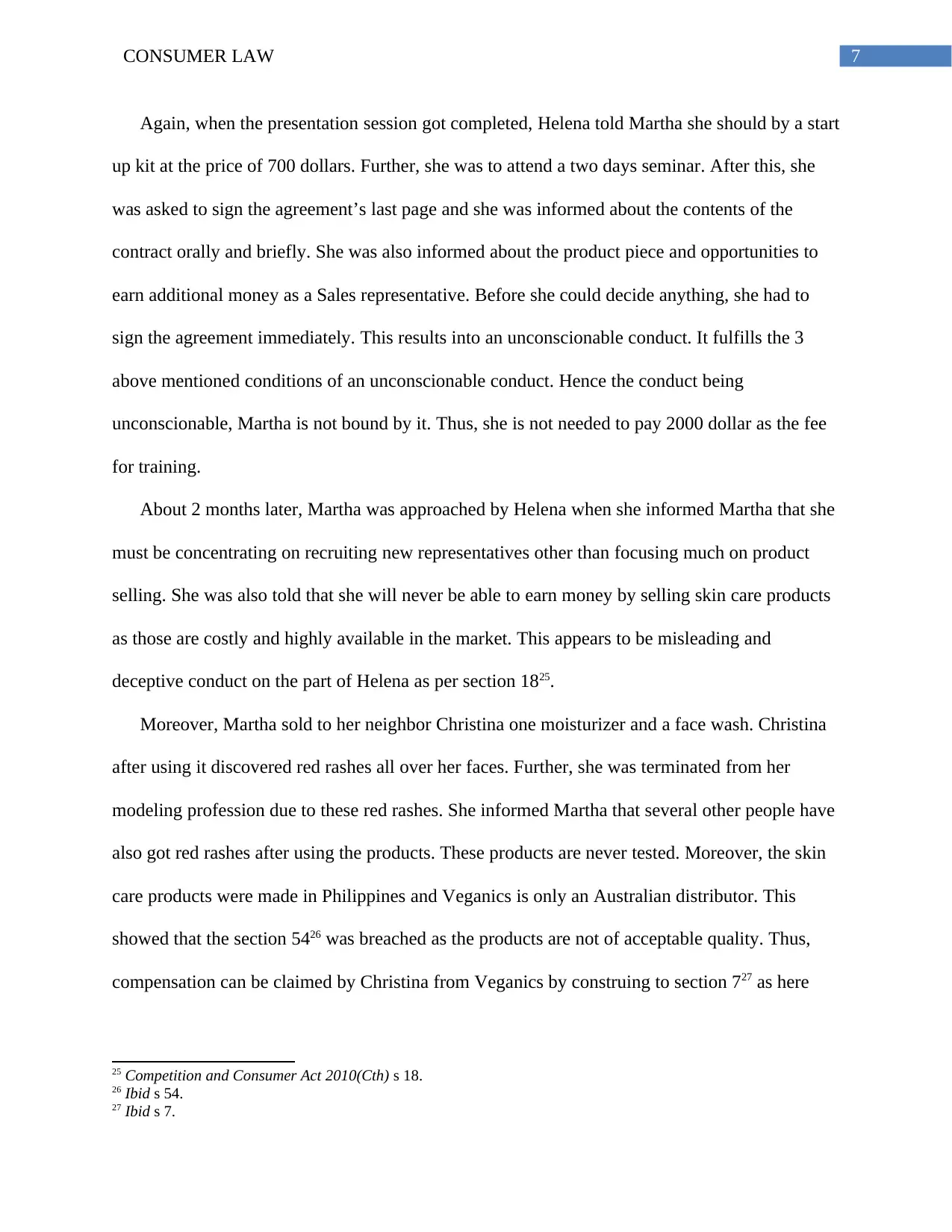
7CONSUMER LAW
Again, when the presentation session got completed, Helena told Martha she should by a start
up kit at the price of 700 dollars. Further, she was to attend a two days seminar. After this, she
was asked to sign the agreement’s last page and she was informed about the contents of the
contract orally and briefly. She was also informed about the product piece and opportunities to
earn additional money as a Sales representative. Before she could decide anything, she had to
sign the agreement immediately. This results into an unconscionable conduct. It fulfills the 3
above mentioned conditions of an unconscionable conduct. Hence the conduct being
unconscionable, Martha is not bound by it. Thus, she is not needed to pay 2000 dollar as the fee
for training.
About 2 months later, Martha was approached by Helena when she informed Martha that she
must be concentrating on recruiting new representatives other than focusing much on product
selling. She was also told that she will never be able to earn money by selling skin care products
as those are costly and highly available in the market. This appears to be misleading and
deceptive conduct on the part of Helena as per section 1825.
Moreover, Martha sold to her neighbor Christina one moisturizer and a face wash. Christina
after using it discovered red rashes all over her faces. Further, she was terminated from her
modeling profession due to these red rashes. She informed Martha that several other people have
also got red rashes after using the products. These products are never tested. Moreover, the skin
care products were made in Philippines and Veganics is only an Australian distributor. This
showed that the section 5426 was breached as the products are not of acceptable quality. Thus,
compensation can be claimed by Christina from Veganics by construing to section 727 as here
25 Competition and Consumer Act 2010(Cth) s 18.
26 Ibid s 54.
27 Ibid s 7.
Again, when the presentation session got completed, Helena told Martha she should by a start
up kit at the price of 700 dollars. Further, she was to attend a two days seminar. After this, she
was asked to sign the agreement’s last page and she was informed about the contents of the
contract orally and briefly. She was also informed about the product piece and opportunities to
earn additional money as a Sales representative. Before she could decide anything, she had to
sign the agreement immediately. This results into an unconscionable conduct. It fulfills the 3
above mentioned conditions of an unconscionable conduct. Hence the conduct being
unconscionable, Martha is not bound by it. Thus, she is not needed to pay 2000 dollar as the fee
for training.
About 2 months later, Martha was approached by Helena when she informed Martha that she
must be concentrating on recruiting new representatives other than focusing much on product
selling. She was also told that she will never be able to earn money by selling skin care products
as those are costly and highly available in the market. This appears to be misleading and
deceptive conduct on the part of Helena as per section 1825.
Moreover, Martha sold to her neighbor Christina one moisturizer and a face wash. Christina
after using it discovered red rashes all over her faces. Further, she was terminated from her
modeling profession due to these red rashes. She informed Martha that several other people have
also got red rashes after using the products. These products are never tested. Moreover, the skin
care products were made in Philippines and Veganics is only an Australian distributor. This
showed that the section 5426 was breached as the products are not of acceptable quality. Thus,
compensation can be claimed by Christina from Veganics by construing to section 727 as here
25 Competition and Consumer Act 2010(Cth) s 18.
26 Ibid s 54.
27 Ibid s 7.
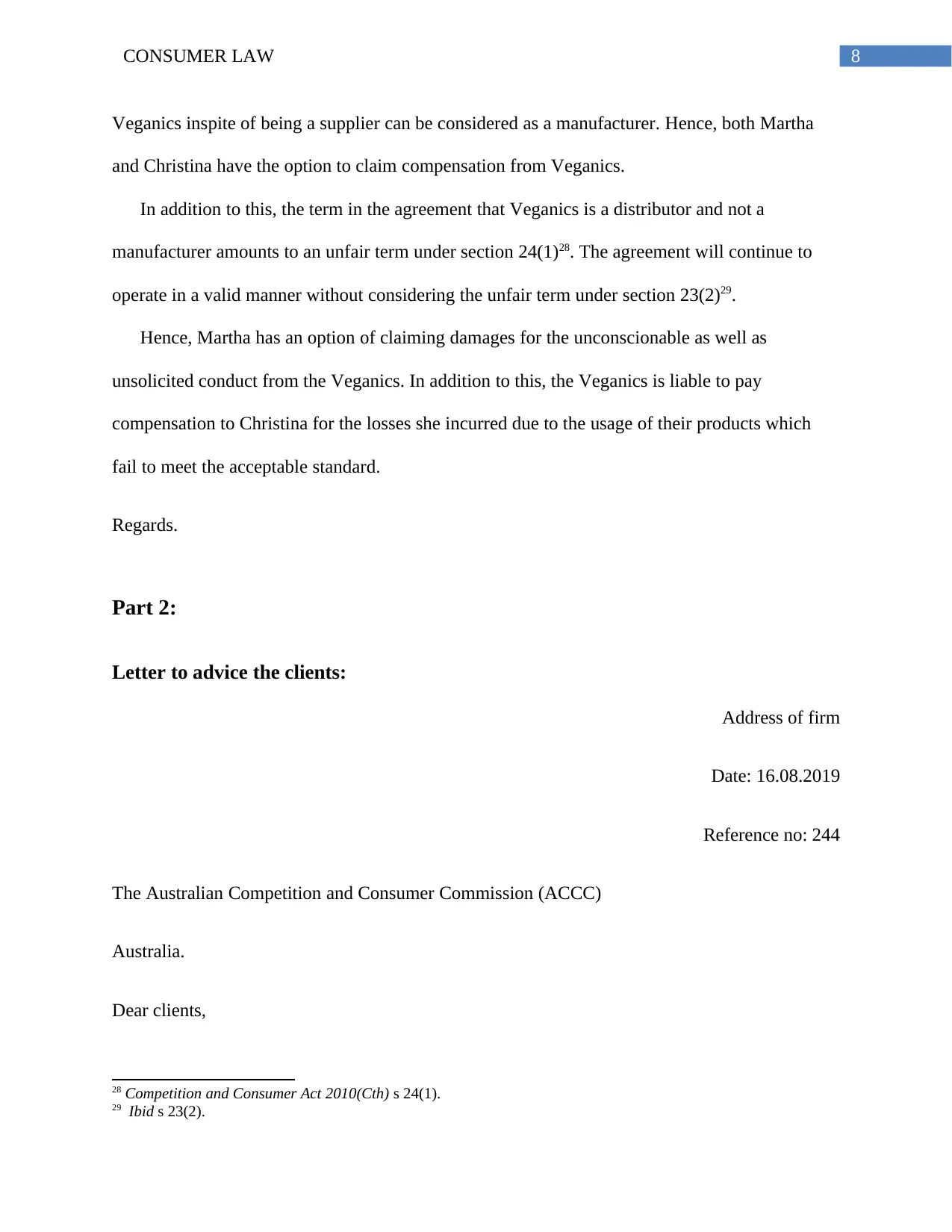
8CONSUMER LAW
Veganics inspite of being a supplier can be considered as a manufacturer. Hence, both Martha
and Christina have the option to claim compensation from Veganics.
In addition to this, the term in the agreement that Veganics is a distributor and not a
manufacturer amounts to an unfair term under section 24(1)28. The agreement will continue to
operate in a valid manner without considering the unfair term under section 23(2)29.
Hence, Martha has an option of claiming damages for the unconscionable as well as
unsolicited conduct from the Veganics. In addition to this, the Veganics is liable to pay
compensation to Christina for the losses she incurred due to the usage of their products which
fail to meet the acceptable standard.
Regards.
Part 2:
Letter to advice the clients:
Address of firm
Date: 16.08.2019
Reference no: 244
The Australian Competition and Consumer Commission (ACCC)
Australia.
Dear clients,
28 Competition and Consumer Act 2010(Cth) s 24(1).
29 Ibid s 23(2).
Veganics inspite of being a supplier can be considered as a manufacturer. Hence, both Martha
and Christina have the option to claim compensation from Veganics.
In addition to this, the term in the agreement that Veganics is a distributor and not a
manufacturer amounts to an unfair term under section 24(1)28. The agreement will continue to
operate in a valid manner without considering the unfair term under section 23(2)29.
Hence, Martha has an option of claiming damages for the unconscionable as well as
unsolicited conduct from the Veganics. In addition to this, the Veganics is liable to pay
compensation to Christina for the losses she incurred due to the usage of their products which
fail to meet the acceptable standard.
Regards.
Part 2:
Letter to advice the clients:
Address of firm
Date: 16.08.2019
Reference no: 244
The Australian Competition and Consumer Commission (ACCC)
Australia.
Dear clients,
28 Competition and Consumer Act 2010(Cth) s 24(1).
29 Ibid s 23(2).
⊘ This is a preview!⊘
Do you want full access?
Subscribe today to unlock all pages.

Trusted by 1+ million students worldwide
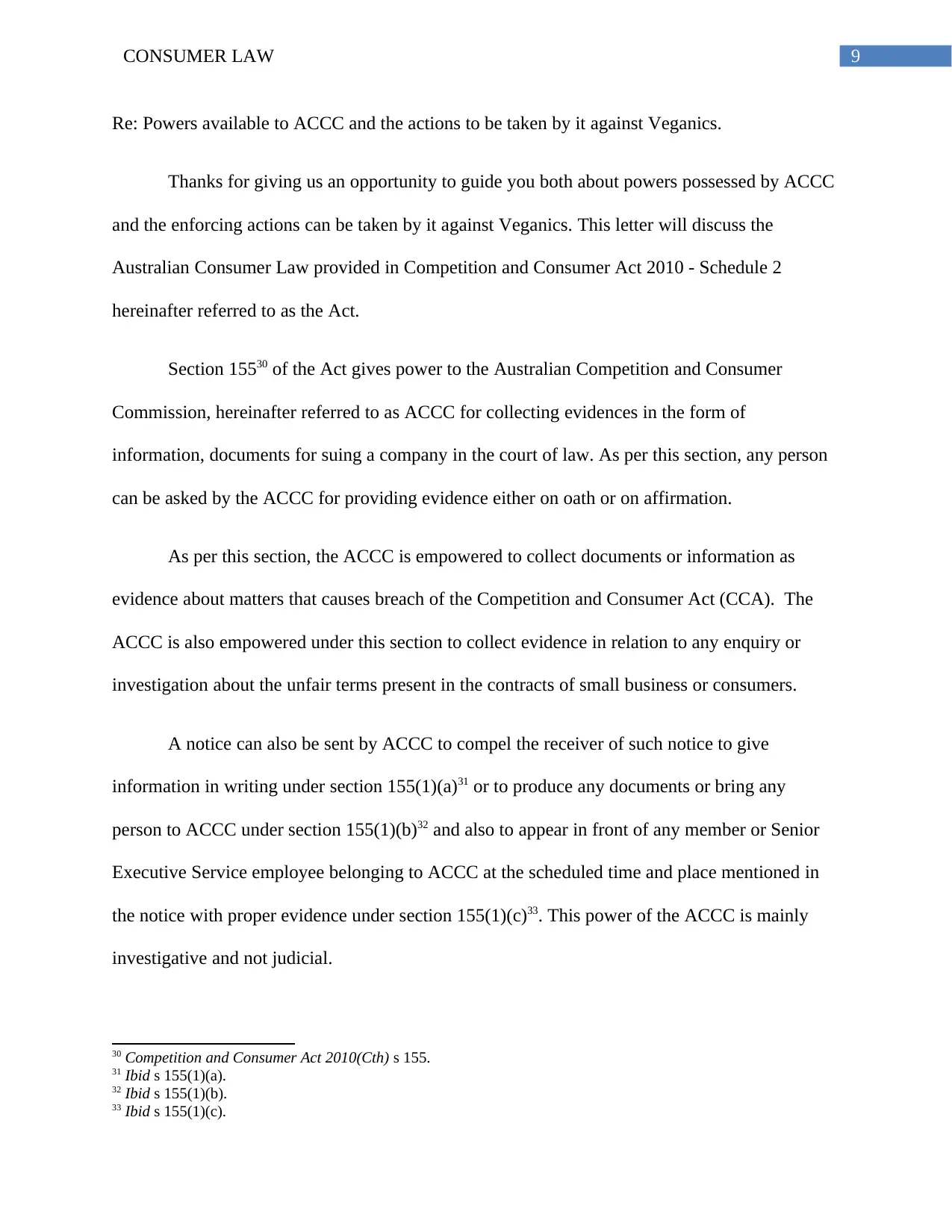
9CONSUMER LAW
Re: Powers available to ACCC and the actions to be taken by it against Veganics.
Thanks for giving us an opportunity to guide you both about powers possessed by ACCC
and the enforcing actions can be taken by it against Veganics. This letter will discuss the
Australian Consumer Law provided in Competition and Consumer Act 2010 - Schedule 2
hereinafter referred to as the Act.
Section 15530 of the Act gives power to the Australian Competition and Consumer
Commission, hereinafter referred to as ACCC for collecting evidences in the form of
information, documents for suing a company in the court of law. As per this section, any person
can be asked by the ACCC for providing evidence either on oath or on affirmation.
As per this section, the ACCC is empowered to collect documents or information as
evidence about matters that causes breach of the Competition and Consumer Act (CCA). The
ACCC is also empowered under this section to collect evidence in relation to any enquiry or
investigation about the unfair terms present in the contracts of small business or consumers.
A notice can also be sent by ACCC to compel the receiver of such notice to give
information in writing under section 155(1)(a)31 or to produce any documents or bring any
person to ACCC under section 155(1)(b)32 and also to appear in front of any member or Senior
Executive Service employee belonging to ACCC at the scheduled time and place mentioned in
the notice with proper evidence under section 155(1)(c)33. This power of the ACCC is mainly
investigative and not judicial.
30 Competition and Consumer Act 2010(Cth) s 155.
31 Ibid s 155(1)(a).
32 Ibid s 155(1)(b).
33 Ibid s 155(1)(c).
Re: Powers available to ACCC and the actions to be taken by it against Veganics.
Thanks for giving us an opportunity to guide you both about powers possessed by ACCC
and the enforcing actions can be taken by it against Veganics. This letter will discuss the
Australian Consumer Law provided in Competition and Consumer Act 2010 - Schedule 2
hereinafter referred to as the Act.
Section 15530 of the Act gives power to the Australian Competition and Consumer
Commission, hereinafter referred to as ACCC for collecting evidences in the form of
information, documents for suing a company in the court of law. As per this section, any person
can be asked by the ACCC for providing evidence either on oath or on affirmation.
As per this section, the ACCC is empowered to collect documents or information as
evidence about matters that causes breach of the Competition and Consumer Act (CCA). The
ACCC is also empowered under this section to collect evidence in relation to any enquiry or
investigation about the unfair terms present in the contracts of small business or consumers.
A notice can also be sent by ACCC to compel the receiver of such notice to give
information in writing under section 155(1)(a)31 or to produce any documents or bring any
person to ACCC under section 155(1)(b)32 and also to appear in front of any member or Senior
Executive Service employee belonging to ACCC at the scheduled time and place mentioned in
the notice with proper evidence under section 155(1)(c)33. This power of the ACCC is mainly
investigative and not judicial.
30 Competition and Consumer Act 2010(Cth) s 155.
31 Ibid s 155(1)(a).
32 Ibid s 155(1)(b).
33 Ibid s 155(1)(c).
Paraphrase This Document
Need a fresh take? Get an instant paraphrase of this document with our AI Paraphraser
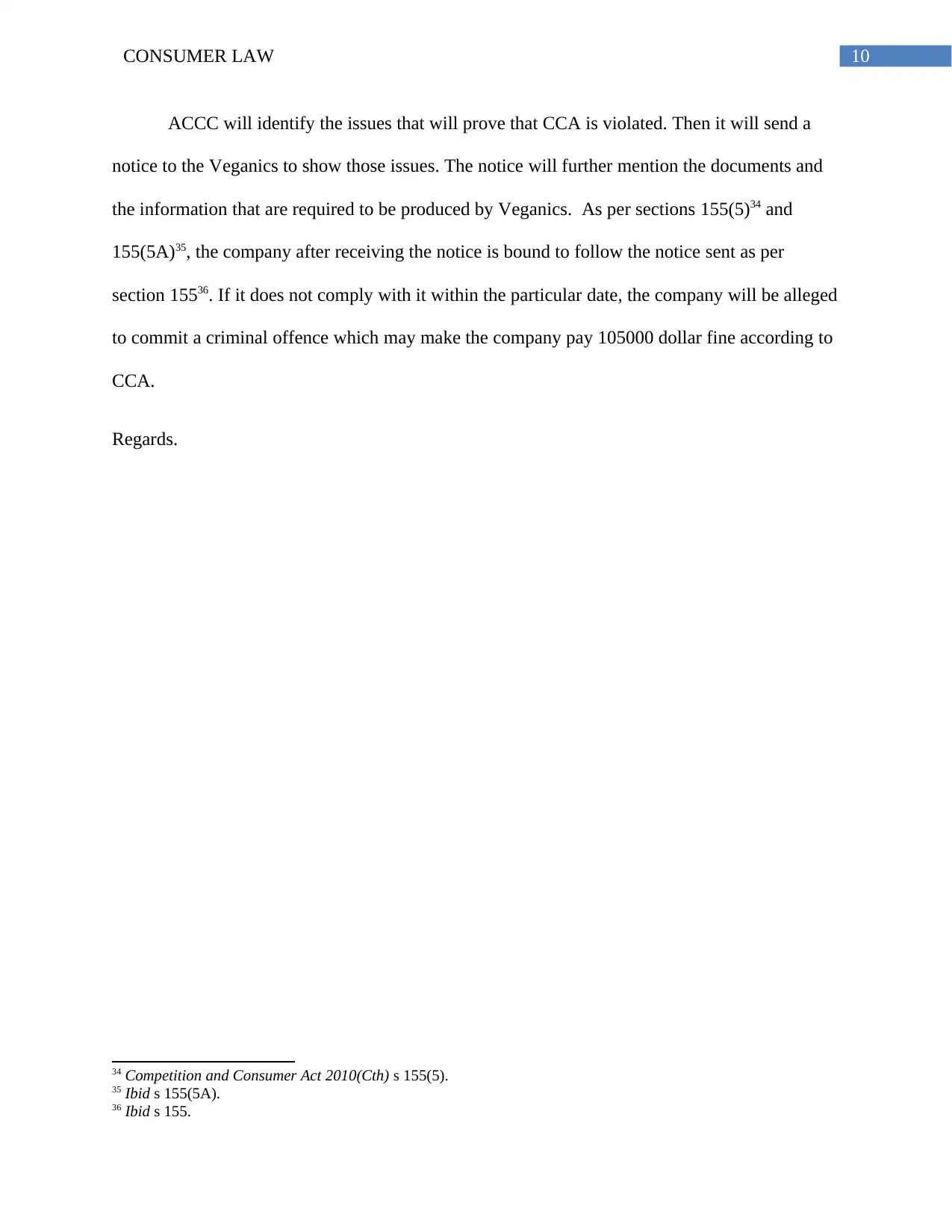
10CONSUMER LAW
ACCC will identify the issues that will prove that CCA is violated. Then it will send a
notice to the Veganics to show those issues. The notice will further mention the documents and
the information that are required to be produced by Veganics. As per sections 155(5)34 and
155(5A)35, the company after receiving the notice is bound to follow the notice sent as per
section 15536. If it does not comply with it within the particular date, the company will be alleged
to commit a criminal offence which may make the company pay 105000 dollar fine according to
CCA.
Regards.
34 Competition and Consumer Act 2010(Cth) s 155(5).
35 Ibid s 155(5A).
36 Ibid s 155.
ACCC will identify the issues that will prove that CCA is violated. Then it will send a
notice to the Veganics to show those issues. The notice will further mention the documents and
the information that are required to be produced by Veganics. As per sections 155(5)34 and
155(5A)35, the company after receiving the notice is bound to follow the notice sent as per
section 15536. If it does not comply with it within the particular date, the company will be alleged
to commit a criminal offence which may make the company pay 105000 dollar fine according to
CCA.
Regards.
34 Competition and Consumer Act 2010(Cth) s 155(5).
35 Ibid s 155(5A).
36 Ibid s 155.
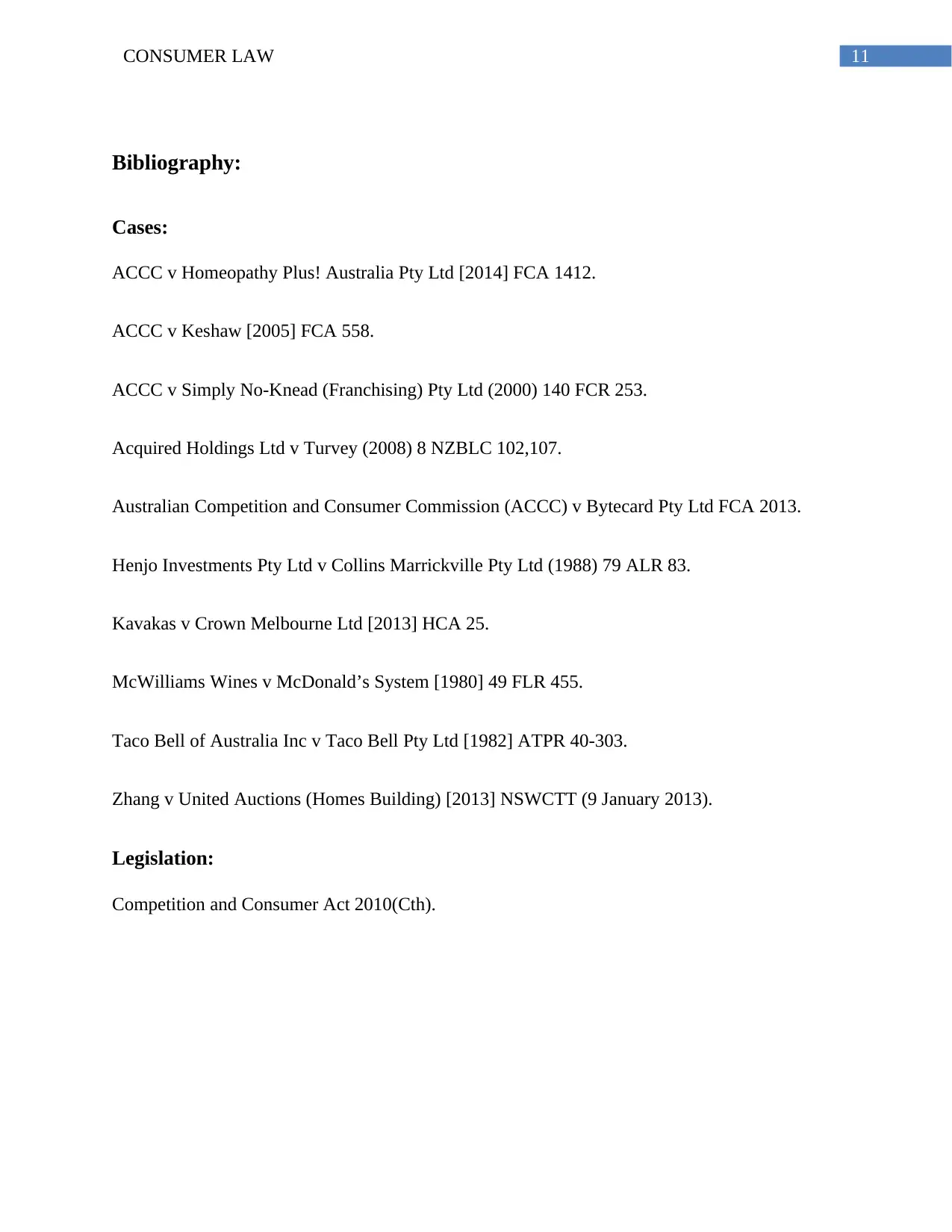
11CONSUMER LAW
Bibliography:
Cases:
ACCC v Homeopathy Plus! Australia Pty Ltd [2014] FCA 1412.
ACCC v Keshaw [2005] FCA 558.
ACCC v Simply No-Knead (Franchising) Pty Ltd (2000) 140 FCR 253.
Acquired Holdings Ltd v Turvey (2008) 8 NZBLC 102,107.
Australian Competition and Consumer Commission (ACCC) v Bytecard Pty Ltd FCA 2013.
Henjo Investments Pty Ltd v Collins Marrickville Pty Ltd (1988) 79 ALR 83.
Kavakas v Crown Melbourne Ltd [2013] HCA 25.
McWilliams Wines v McDonald’s System [1980] 49 FLR 455.
Taco Bell of Australia Inc v Taco Bell Pty Ltd [1982] ATPR 40-303.
Zhang v United Auctions (Homes Building) [2013] NSWCTT (9 January 2013).
Legislation:
Competition and Consumer Act 2010(Cth).
Bibliography:
Cases:
ACCC v Homeopathy Plus! Australia Pty Ltd [2014] FCA 1412.
ACCC v Keshaw [2005] FCA 558.
ACCC v Simply No-Knead (Franchising) Pty Ltd (2000) 140 FCR 253.
Acquired Holdings Ltd v Turvey (2008) 8 NZBLC 102,107.
Australian Competition and Consumer Commission (ACCC) v Bytecard Pty Ltd FCA 2013.
Henjo Investments Pty Ltd v Collins Marrickville Pty Ltd (1988) 79 ALR 83.
Kavakas v Crown Melbourne Ltd [2013] HCA 25.
McWilliams Wines v McDonald’s System [1980] 49 FLR 455.
Taco Bell of Australia Inc v Taco Bell Pty Ltd [1982] ATPR 40-303.
Zhang v United Auctions (Homes Building) [2013] NSWCTT (9 January 2013).
Legislation:
Competition and Consumer Act 2010(Cth).
⊘ This is a preview!⊘
Do you want full access?
Subscribe today to unlock all pages.

Trusted by 1+ million students worldwide
1 out of 12
Related Documents
Your All-in-One AI-Powered Toolkit for Academic Success.
+13062052269
info@desklib.com
Available 24*7 on WhatsApp / Email
![[object Object]](/_next/static/media/star-bottom.7253800d.svg)
Unlock your academic potential
Copyright © 2020–2026 A2Z Services. All Rights Reserved. Developed and managed by ZUCOL.





